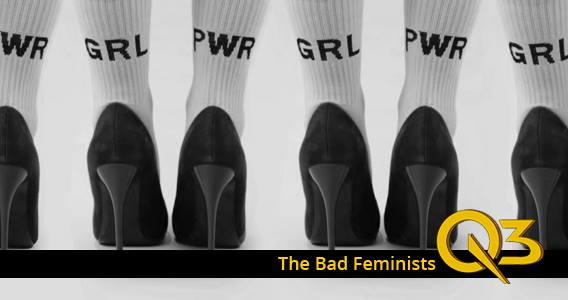By Samantha Harford
It doesnÔÇÖt take much effort to search the market for the feminist agenda; a simple google search of ÔÇÿfeminist clothingÔÇÖ comes up with 113,000,000 results of ÔÇÿFeminist AFÔÇÖ, ÔÇÿGRLPWRÔÇÖ or ÔÇÿThe Future is FemaleÔÇÖ slapped over t-shirts. But to me, as I looked at these results I begun to ask, what is the intention behind these sales? With ÔÇÿwokenessÔÇÖ sweeping through social channels, it makes me worry that the cause behind feminism is being forgotten and has just become a marketing tool for our fashion retailers and musicians alike. ÔÇÿFemvertisingÔÇÖ, a method of advertising feminism to champion success, has been present in campaigns for decades, sure ÔÇô thereÔÇÖs nothing wrong with the carefree rollerblading girl for Tampax, or even better, with BodyformÔÇÖs 2016 advert featuring real blood and the tagline ÔÇÿWomen bleed in sport all the time, but it doesnÔÇÖt hold them back. Why should periods be any different?ÔÇÖ. This is the kind of stuff that makes me say ÔÇÿyes! Take my money!ÔÇÖ But itÔÇÖs not all black-and-white when it comes to feminism and marketing. I frowned when I read about DiorÔÇÖs releasing of another feminist slogan slapped on a top last Spring, guessing rightly that theyÔÇÖll probably charge a ridiculous $700 like their last-season copy. That much for a white tee-shirt, just because it says something feminist on it? Sure, a part of the proceeds from sales are being sent to a charity foundation supporting womenÔÇÖs rights, yet I canÔÇÖt help but feel that somehow Dior, and other brands, are trying to cash in on this movement as if itÔÇÖs another seasonal trend.
And to make it worse, the brands who were quickest to jump on the feminist-train, H&M, ASOS,┬áand Primark, who all sell numerous garments slathered in feminist slogans, donÔÇÖt exactly walk-the-walk when it comes to displaying their support. Their sketchy attitudes towards questioning over the use of factory workers overseas in countries where worker’s rights are next to none, suggest that theyÔÇÖre not as good going as one might think. ItÔÇÖs pretty ironic, really, being so quick to slap the word ÔÇÿfeministÔÇÖ on a tee-shirt when evidence so clearly points to these companies as being nothing even close with their exploitation of sweat shops in places like Bangladesh. So although yes, it can certainly be said that marketing feminism (although probably for the wrong reasons) can be a good thing as it circulates these positive ideals, I worry that lives are being exploited whilst this is happening and that is completely, utterly and undeniably wrong. IsnÔÇÖt there a better way to circulate the feminist agenda?
The inclusion of audience tastes has always been a well-recognised marketing strategy and can also be undeniably a powerful tool for important causes such as feminism. With public spaces plastered in posters, LED signage and customised ads on our social feeds we have become a very impressionable audience. I get that itÔÇÖs fairly reasonable to acknowledge the harm done by brands and musicians in commercialising movements, but the chance that this circulation of feminist ideas could become impressionable for me and to extent, outweigh the harm done in general. I simply have to take a look back into my childhood to see how positively the commercialisation of girl power influenced me ÔÇô with the Spice Girls. It wasnÔÇÖt that long ago that adolescent me and my girlfriends would scream ÔÇÿSo you wanna be my lover? YouÔÇÖve gotta get with my friendsÔÇÖ at the top of our lungs in the playground, and although I perhaps didnÔÇÖt get the deeper context behind those words, itÔÇÖs hard to deny the impressionable stamp these girls made on me. This coming-of-age, pink-loving girl band were one of the first to take everything girly about femininity and market it in such a successful manner. Yet, by buttoning up and conforming to gender roles, Sporty, Scary, Posh, Ginger, and Baby never lost control of how they wanted to be presented; it was all about having power over themselves. As I grew older and learnt more about the feminist movement, I realised that my definition of feminism was curated all those years ago with these four girls at the forefront. They taught me that feminism is about being who you are unapologetically ÔÇô whether thatÔÇÖs being a pink-tastic bubble-gum chewing gal to anything else I learnt that their marketing message spoke directly to and resonated with feminine cultural experiences of so many young teens.
What I suppose IÔÇÖm trying to say is, yes, for the most part, including feminism in marketing can be a positive. Whether itÔÇÖs the ÔÇÿdanceabilityÔÇÖ of a bop, a reclamation of the colour pink or addition to the fashion industry ÔÇô the fun nature of this offers a sense of freedom and inclusion in which everyone can express themselves and spread the wider message. It includes people outside of the regular women studies classroom into the conversation, and circulating the right feminist ideals canÔÇÖt do any harm, after all. But we do need to be stricter about what we accept in this strategy. Supporting and buying from companies who openly exploit their workers, like these fast-fashion brands who sell ÔÇÿfeministÔÇÖ tee-shirts, does more damage than good at the end of the day. If you can, buy from smaller brands whom you know to have good ideals, share that pop-song you love so much with the rest of your friends, and spread the message. Feminism and marketing can be the perfect match if you make it well.









